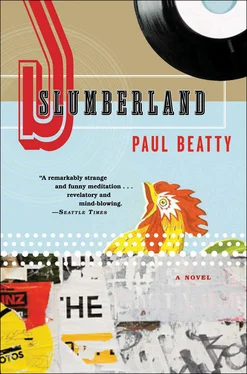His music seemed to call out to them, especially Fatima, who more than once showed up at my place with a medical bracelet tied around a bloodstained wrist bandage. Sometimes in the middle of a tune Little Sis would hyperventilate. Gasping for air, her eyes would roll into the back of her pretty head and her chest would heave in time with the song. Once she OD’d on his music, passing out and falling to the floor unconscious with the cultic smile of a Beatlemania-stricken coed plastered on her face. It took a loud, cold, bracing splash of Joy Division to bring her back, and the first thing she said upon regaining consciousness was, “When I die I want to be listening to Charles Stone.” I didn’t see the von Robinsons for a while after that. Then one Sunday night Klaudia showed up at my door alone.
Most women think they’re strong. They like to wrestle men down to the floor and put them in what they think is some inescapable choke hold. Instead of tossing these delusional wannabe grapplers effortlessly out the window, we males humor them. Feign submission. Praise their yoga-toned physiques. “Whoa, look at those muscles! No, really, I couldn’t breathe.”
When I opened the door that fateful Sunday night Klaudia stormed inside, a kiai blur of martial arts expertise unseen since the likes of Lady Kung Fu. Little Miss Fists of Fury kicked off her shoes and judo flipped me over her shoulder, slamming me hard onto the living room floor. Before I could ask what I had done wrong, I was knee dropped in the groin, elbow struck in the larynx, and nearly strangled to death with my own shirt collar, all in rapid succession.
With a belch redolent of fine tequila, she clambered off my contorted heap of flesh and bone and announced she’d broken up with her boyfriend and that Fatima was in the hospital. Without asking permission, she stuck the chicken-fucking song into the VCR and poured herself a drink that she obviously didn’t need.
I parted the curtain of stringy clumps of dirty blonde hair that covered her flushed red face.
“Was ist los?”
She told me Fatima was in the hospital. She’d swallowed a bunch of pills and chased them down with a bottle of tequila.
I pressed the play button and the chicken-fucking song lifted her out of my arms. She began to dance. Arms cocked at oblique angles, she moved as if the song had been written for her. Her lithe body the spindle, the record playing around her.
Slowly, almost contritely, she corkscrewed herself into and out of the ground. There wasn’t much room, but she managed to express herself. The black soles of her bare feet slapped and pawed softly on the hardwood floor. As she danced, she told me the story of the von Robinson sisters.
Growing up black in all-white East Germany — a totalitarian state where there was free education, no unemployment, and no discrimination — the concept of race didn’t officially exist. Being proletarian and, as Klaudia put it, “inofficially black” was hard. At least she had her judo and her studies. She was good on both the mat and in the classroom. She had heroes like East German judo champion Astrid Timmermann and Valentina Tereshkova, the first woman in space. She’d contemplated a run at the Olympic games until her late mother made a big show of taking away her vitamin supplements and mentioning that Astrid Timmermann had a clitoris the size of an earthworm. She considered majoring in physics and applying for the Soviet space program until her quantum mechanics teacher told her that the Russians had already sent a monkey into space.
Fatima didn’t have hobbies or interests. All she had were pronounced bouts of depression and her sister’s broad shoulders to lean on.
It was hard being black in red East Germany. But the von Robinson sisters were determined to find out if they were indeed black. And if so, how black were they, and did it matter? They set upon developing a self-taught black curriculum. Theirs was an extremely independent course of study that consisted of lots of Pushkin and the Voice of America radio show.
“I’ve come to understand love wasn’t made for me. .” was a favorite quote from the black Russian poet, one that carried them through many a lonely and dateless weekend night. And when their tired eyes could no longer focus on the books, Willis Conover’s Voice of America radio program tucked them into bed. Conover’s voice was indeed America. “This is the music of freedom,” he’d say, enouncing each letter with propaganda perfection. At first, all the then non-English-speaking sisters understood was “Duke Ellington.” They could, however, hear the respect Conover had for the music and the musicians. The way he said, “This week the immortal Zoot Sims is in Seoul, South Korea, at the Matchstick Club. Oscar Peterson, Caracas, at the Mephisto.” They loved the music, but his interviews with the musicians were best. Unhurried. Measured. They could hear colors in the language, the relaxed whiteness in Conover’s shirt, his teeth and skin, the black cautiousness in his subjects’ voices and minds. Other than the Muhammad Ali rants on the news, and Pushkin’s poetic voice in the poems of which they’d grown so fond, these interviews were the only times they’d ever heard a black man speak. They reminded them of the father neither of them had ever seen. They sounded so close. Maybe Conover was a Soviet-bloc jazz fiend disguising himself as an American disc jockey, thinking it would never occur to the authorities to look for him in a rooftop studio in Prague or Belgrade. One night, Conover introduced a record with such anticipation in his voice that Klaudia looked up from Eugene Onegin . “Here’s a song you have not heard before,” Conover said, his voice cracking. His voice never cracked. “Charles Stone with ‘Darn That Dharma.’ ” When the song came on Fatima literally shook with happiness. She had found her blackness. After that it no longer mattered that her mother never told them who or what their father was beyond being “asshole-colored.” White, black, Arab, Mexican, asshole, it didn’t matter. They’d been reborn black. Pushkin black. Black belt black. First-woman-in-space black. German black. That was their story.
It was my mother’s feet that drove me to white women. Every other Sunday she’d drop those crusty appendages in my lap. Her toes hammered and gnarled at the knuckles with corns harder and darker than tree knots. Her nails were ridged like party-dip potato chips, and the ones that weren’t black were spectrograph bands of fungus brown. On Sundays I was forbidden to leave the house until I’d clipped her nails, filed down every bunion, barnacle, and callus, scraped the lint and gummy grit from her cuticles and crevices, chiseled the dead skin from her cracked and dried-out heels. Afterward my hands would smell like wet leather and my shirt would be caked with filings, rolls of toe jam, nickel-sized flakes of dead skin, and baby powder.
Klaudia’s dancing feet could pass for white. Her toes plump and unhammered and corn-free, they smelled like fresh-cut grass. When she was in the mood she’d hoist her pants above the knee, place a cool sole on my face, and with my cheekbone framed in the arch, massage my temples with her big toe.
“I can tell you’re in tension,” she’d say.
I’d deny being “in tension” and pop that toe into my mouth. Marshmallow soft and tasty as children’s vitamins, I’d suck on it, tracing every loop and whorl. Dip the tip of my tongue in ink and I could sketch her feet from memory.
As a result of her judo training, Klaudia experienced the world with her feet. When they weren’t touching the ground she was an uprooted tree, listless and silent as the romantic poet’s fallen bough.
Ifa woman has an orgasm and there isn’t
anyone to hear it, does it make a sound?
Читать дальше












